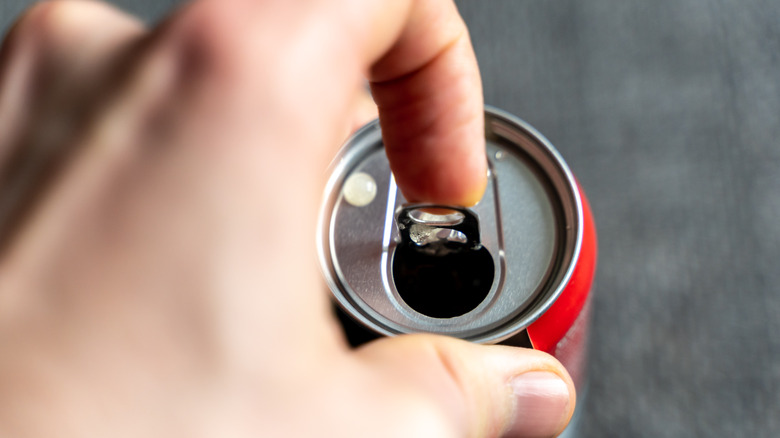Are Energy Drinks Worse For You Than Soda?
You already know how important it is to stay hydrated, but that's rarely a good reason to chug a can of fizzy soda. A 2016 report by the U.S. Department of Agriculture concluded that Americans who consumed cola and other soft drinks were in worse health than those who chose other beverages. Specifically, soda has been linked to health conditions including obesity, heart disease, Type 2 diabetes, and weakened bones (per MedicineNet). Diet versions are no better — aspartame, an artificial sweetener commonly found in diet sodas, may cause depression, liver disease, and even neurodegeneration, according to a 2021 study published in Nutrients.
Swapping a soda for an energy drink might seem like a smart idea. After all, energy drinks are often marketed as a source of vitamins and caffeine needed to power through workouts and other activities. However, these drinks aren't so different from soda when it comes to your health. In fact, they may even be worse.
Energy drinks are often overloaded with sugar and caffeine
Like soda, energy drinks are often packed with sugar that can lead to serious health issues, such as Type 2 diabetes, heart disease, and gout, according to Harvard T.H. Chan School of Public Health. One serving can contain around 40 grams of sugar, surpassing the American Heart Association's recommended daily limit of added sugar, which is a little over 37 grams for men and 25 grams for women.
Even if you choose sugar-free energy drinks, the high levels of caffeine can make these beverages worse for your health than soda. The National Center for Complementary and Integrative Health explains that the caffeine content in energy drinks is often much greater than your average can of soda. Large amounts of caffeine may cause high blood pressure, alter heart rhythm and heart rate, interfere with digestion, and trigger anxiety and sleeplessness.
Additionally, a 2017 study published in the Journal of the American Heart Association compared participants who drank energy drinks with participants who consumed the same amount of caffeine in a different beverage. The study discovered that those who drank the energy drinks were more likely to experience irregular heart rhythms and prolonged elevated blood pressure. This led researchers to believe that ingredients in energy drinks, besides caffeine, may cause negative health outcomes.
Instead of reaching for sodas or energy drinks, water is always a safe choice, says WebMD. If plain water sounds boring, try black coffee, unsweetened tea, sparkling water, or milk.


